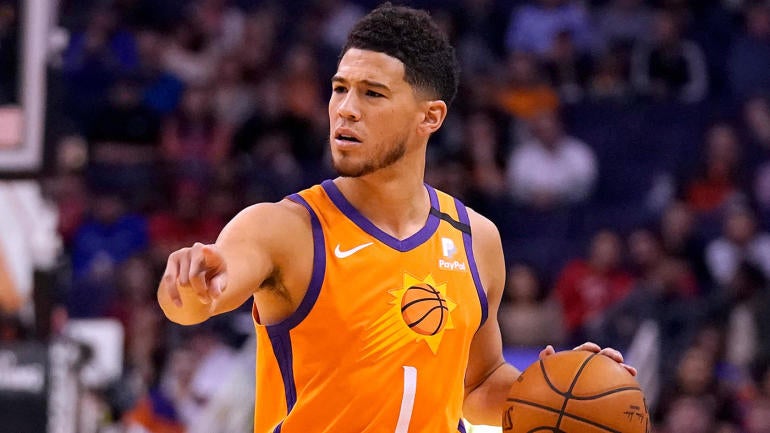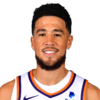
In the five years that Devin Booker has been in the NBA, he's been the poster child for being the "good stats/bad team" player, as the Phoenix Suns have failed to eclipse even the 30-win mark since drafting him in 2015. Each year, though, Booker comes back with something new added to his game.
However, as Booker continued to ascend in Phoenix, the team around him was in constant disarray. He's had five different head coaches in the five seasons he's been a pro, and has been surrounded by talent that either didn't want to be there or veterans on their way out of the league. It yielded terrible team results, but Booker's individual talent was undeniable.
Booker, who is still just 23 years old, has already vastly improved in areas that were weaknesses, or in the process of doing so. He's become a more efficient scorer capable of joining the 50/40/90 club someday. His playmaking has developed to the point where he's averaging nearly seven assists a game, and his defense, while still questionable, has significantly improved from previous years. He went from being a complete liability on that end of the floor to someone who is far more engaged and locked in to deflect passes and hold his own against opposing players.
To this point, we've all seen what Booker is capable of doing on terrible teams. We've seen him put up 50 points and still lose because the players around him can't contribute effectively. What we don't know, though, is what he looks like surrounded by other quality talent with an actual chance of winning games. In order for Booker to take another leap in his game, and shed the label of being an empty stats player, the Suns need to create roster stability around him.
Booker's had 69 teammates in just five years of NBA action. Compared to Justise Winslow, who was drafted three spots ahead of Booker and has played with 42 different teammates, that's a striking number.
This season was a step in the right direction, though. Phoenix surrounded its star guard with talent for the first time in his career, and he showed glimpses of what that next step for him and the Suns could look like. Ricky Rubio took the burden of initiating the offense off of Booker. Mikal Bridges and Kelly Oubre became reliable wing scoring options who could hide Booker's deficiencies on defense. Deandre Ayton showed improvement on both ends of the floor in his second year, and Aron Baynes brought intensity and hustle to ignite the Suns bench.
All of this factored into Booker's usage percentage dropping from 33 percent last season to 29 percent, a decrease in the number of shot attempts he's taking and improved shooting numbers across the board. The only issue, however, was the amount of injuries Phoenix suffered which derailed any hope at a promising season. The Suns had 12 different players sidelined with injuries at different points in the season, accounting for a total of 136 missed games combined. That's not counting the 25-game suspension Ayton served at the start of the season.
Injuries aside, though, in the small window when the Suns had their roster completely healthy, they looked like a team capable of competing for a playoff spot, with Booker at the center of it all.
Booker flashed his improved playmaking when Bridges and Oubre were out on the wings, and showed that whether he has the ball in his hands or not, he can impact the game on offense in a variety of ways. The 23-year-old guard is still relied upon heavily to make Phoenix's offense chug along. The Suns' offensive rating is 113.7 when he's on the floor, as opposed to a lowly 98.7 when he's off it. Most of that is because later in the season when the injuries started to pile up, the Suns reverted back to the one-man show of Devin Booker.
When the team was healthy, good things happened. Booker established great chemistry with Rubio, who had statistically the best season of his career, and his pick-and-roll connection with Ayton blossomed even more. The Suns found a potential lineup for the future with Booker, Rubio, Bridges, Oubre and Ayton, as that unit outscored opponents by 20.2 points per 100 possessions. That was only in 226 minutes of action, but that small-ball lineup allows the Suns to be a lot more versatile on both ends of the floor.
The Suns ranked first in the league in assists this season, averaging 27 a game. Compared to ranking 29th two seasons ago, and 20th last year, that's a significant sign that they're heading in the right direction. There was far less of Booker coming up the floor and dribbling the ball for 20 seconds to then throw a shot up, and more ball movement to get everyone involved. Booker was free to move around without the ball and come off screens to knock down shots, or act as a secondary facilitator alongside Rubio to setup a play.
As promising as some parts of the 2019-20 season have been for Phoenix, it's just one step on a difficult journey to competing for the playoffs in the West. The Suns still only won 26 games before the hiatus, which is the most wins since Booker's been there, but still not a significant amount of progress. Lack of chemistry was a major sticking point throughout the season, especially in close games. In clutch situations, the Suns posted a 6-21 record, and routinely lost games where they were up big early on, only to fall apart down the stretch.
Those things can be improved, though, as long as the Suns retain their key pieces going forward. Booker showed in spurts throughout the season what he's capable of when there are players around him who can also contribute to winning. Now he and the Suns need to build upon that. Booker's never had any real team stability since he's entered the league, and this group of guys is his best chance at building that and changing the way he's perceived around the league as an empty stats player.




















